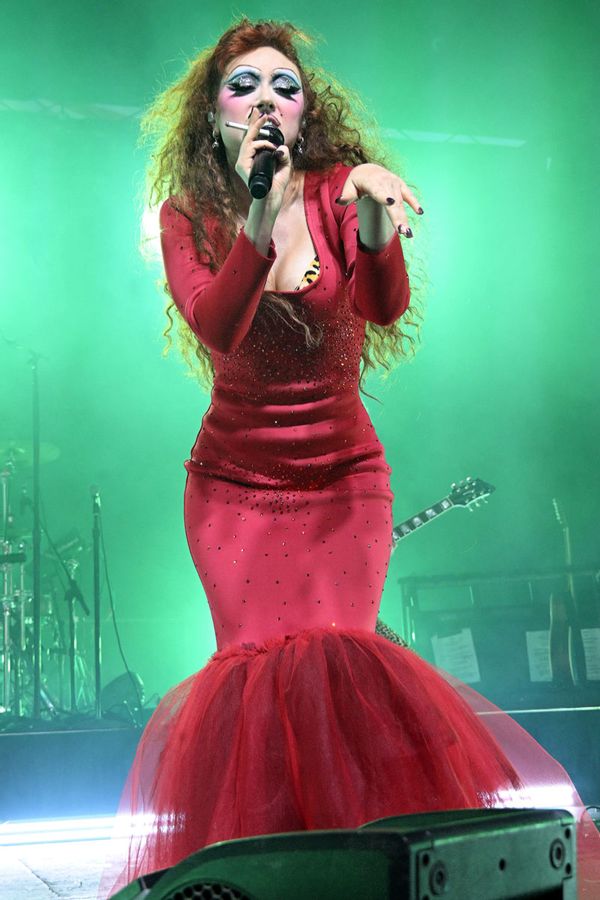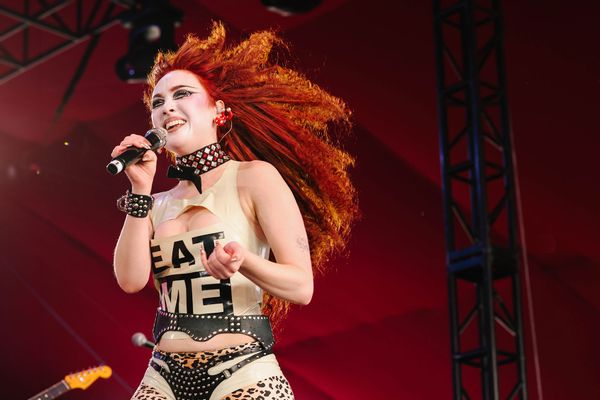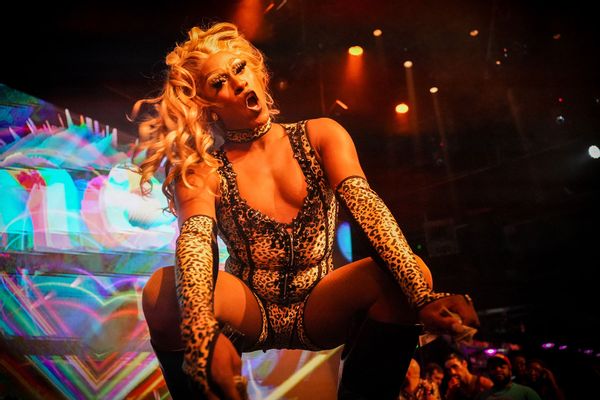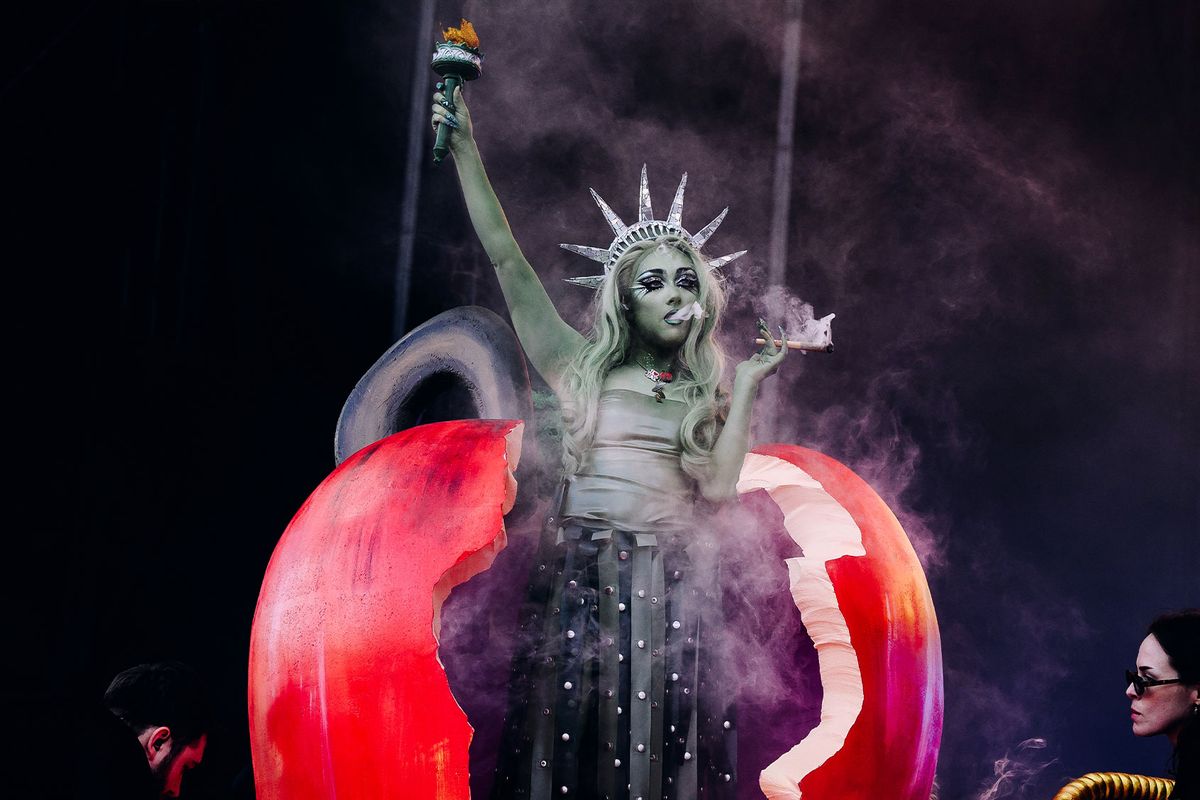"I'm your favorite artist's favorite artist," Chappell Roan said on the Coachella main stage singing to thousands in the California desert heat in April. On "The Tonight Show Starring Jimmy Fallon" in June, she explained, “That was a reference to ['RuPaul’s Drag Race' Season 15 winner] Sasha Colby. Sasha Colby said, ‘I’m your favorite drag queen’s favorite drag queen.’ And it just hit me through the heart."
If you know only one thing about rising music star Chappell Roan, let it be that the 26-year-old singer's music, aesthetic and fashion are all fully inspired by drag. She told People Magazine that her 2023 album, "The Rise and Fall of a Midwest Princess" is “just daydreams in drag.”
"She's a real tiny little thing. Her energy of love was just bigger than her body size, if you will."
The openly queer artist is rapidly ascending into a level of pop stardom that even Roan herself didn't see coming. From viral performances at Coachella and the Governors Ball Music Festival to a heart-wrenching song about the girl you're in love with denying her sexuality, Roan's almost overnight success has fascinated listeners, prompting them to question who exactly she is.
I was in the crowd at New York City's Governors Ball when Roan came out painted head to toe in a rusty lime green, crown on top of her long green wig and a torch in one hand and a blunt in other. She was Lady Liberty, but with a twist. She denounced the White House's invitation to perform for Pride and fervently advocated for the rights of several groups.
"I am in drag of the biggest queen of all, but in case you had forgotten what's etched on my pretty little toes: 'Give me your tired, your poor; your huddled masses yearning to breathe free.' That means freedom and trans rights," she said. "That means freedom and women's rights, and it especially means freedom for all oppressed people in occupied territories."
Both Roan's passion for drag and progressive outspokenness has drawn the LGBTQ+ community to her. Salon spoke to Denver drag artist and co-chair of Black Pride in Denver, Juiccy Misdemeanor, who was asked to open for Roan's tour earlier this year. Juiccy described the crowd's energy as unexpectedly welcoming. "It was like I was hit by a wall," she said.
But mostly, Juiccy is in awe of the awareness Roan drew attention to at the Governors Ball. "I thought it was beautiful. I was like, work. This is a political platform that she was also utilizing as well. That look made so many statements. The Statue of Liberty is a political figure, it's a landmark, and it's a historic thing. For you to dress as her, but then also be who you are, support LGBTQ, say "F**k you," this whole message, up to that White House – it's so beautiful. You're using your line, your platform, to really just build something for this community and it's for people."
Read more of my interview with Juiccy Misdemeanor down below.
The following interview has been edited for length and clarity.
How did you get the opportunity to open for Chappell Roan in Denver? I know she had put out a tweet looking for drag artists to open for her on tour.
I want to say tour manager, or someone in her crew, Instagram DMed me. It was random, and I thought it was a joke, but his name was Kyle Boland [of The ART] . . . But he had messaged me over for Chappell Roan and saying, her tour was looking for Queens or artists. I had to do a little recon, because I'm from the Midwest, but I didn't know. And I was like, "OK, this is real."
Can you speak to what that experience was like? Is this your first time opening for a mainstream artist? What was the energy and environment like at a Chappell concert?
This was my first time opening for a mainstream artist in capacity with drag. It was very humbling for sure. And at the Boulder Theater. First of all, the energy was already infectious outside because the line was so long. She has those themes, the dress code themes, and so everyone was in this, like psychedelic, futuristic moment. I walked up; they were screaming. And I was like, "Oh my god!" We get to the Boulder Theater and we get downstairs to our dressing rooms — amazing setup and an all-access pass. Chappell's doing yoga and stretching and getting her makeup done. All of a sudden, we get to meet her, and it's a whole moment. She's really sweet. She's a real tiny little thing. Her energy of love was just bigger than her body size, if you will.
 Chappell Roan performs during the 2024 Kentucky Pride Festival at Waterfront Park on June 15, 2024 in Louisville, Kentucky. (Stephen J. Cohen/Getty Images)
Chappell Roan performs during the 2024 Kentucky Pride Festival at Waterfront Park on June 15, 2024 in Louisville, Kentucky. (Stephen J. Cohen/Getty Images)
Chappell has gathered inspiration from the Divine, wearing a look similar to her “Pink Flamingos” style of over-drawn lips, a mole and blue eyeshadow – what do you think of this homage?
It's very intuitive. It's very smart. It's on brand. I feel like she always comes to that. She just said the other day, I watched her interview, she did the whole New York performance, and they were inviting her to perform at the White House. She was talking about how "until you do these things in my community, this is all you get." Her playing homage to Divine for instance in drag — it's like a simultaneous connection because drag is a protest. I feel like she's protesting in her own way through her music and her looks. It's smart the way she looks. I think it's very, deeply connected to how she feels, as far as her support and advocacy of LGBTQ. It's really like all personal protests. Also just a really beautiful thing that she's keeping an open space for the LGBTQ community.
What about icons like Divine are so universal to drag artists and to queer people? How do they inspire young people who are interested in the drag art form?
"She really was just doing her music, saying her piece and wearing fierce looks, and the great community saw refuge in that."
You just said that universal connection and that universal reach. I think Divine really has a way of just — drag in general — bringing people together and making a safe space for everybody. Just being someone who makes space and hold space and makes themselves known as someone who is unapologetically themselves. If I saw that as someone who was just trying to be a drag artist, I would be most definitely inspired. If I see someone just doing what they want to do, and now they want to express themselves fully with no hesitation then I'm trying to do the same thing. I would immediately be inspired as I was with other drag artists who inspired me when I was growing up. So I think that Divine's presence is something that's gonna hopefully inspire and encourage those younger choosing drag to really, actually do what they want to. But also just seeing how they inspire Chappell and the music influence, I guess these small inspirations continue to thrive and also continue to help our community grow.
How does drag tell a story through fashion and makeup?
Just think about this way, if you see a drag artist and they didn't have any clothes and makeup . . . It's like, we turn into our other selves, like an alter ego. We form a different persona through our expression of lipsyncing, acting, dancing. But also the clothes and makeup are more so the definitive of the personality itself. So like myself as Juiccy Misdemeanor: yes, my style of choice, yes, my style of drag, yes, my hair, makes me a certain type of drag artist. But when you see me and see me do things like wear makeup you better know who I am because I do my makeup, my clothes in a certain way. That certain way is to express my story of who I am in drag. So personally, I feel like I'm very inspired by old school Southern Belle pageantry drag, very high, glam and sparkly. Again, those things help convey the story of who you are as a drag artist.
As someone who's seen Chappell in person what do you feel like her fashion or her makeup says about her as an artist or as someone who's putting on a drag persona on stage?
When I first saw her look, I thought avant-garde. I thought inside out. She expresses herself through her music and song outwardly. She's very outgoing. On top of that, with her clothes and her hair, making her look a complement of that. [She's] basically out of this world when she dresses. Then she asks the audience do the ["HOT TO GO!" dance] with her. She's out of this world but also fully connecting with the audience because you guys are wearing the same thing, I'm wearing the same thing, which is you supporting me. I love it. It makes me feel good. My energy starts out with costumes and looks. She's inviting us into her world and asking the audience to engage in the look. It's all one big party.
"I feel like the LGBTQ community is gonna take over the world."
 Chappell Roan performs during the first day at the Coachella Valley Music and Arts Festival on Friday, April 12, 2024 in Indio, CA. (Dania Maxwell / Los Angeles Times via Getty Images)
Chappell Roan performs during the first day at the Coachella Valley Music and Arts Festival on Friday, April 12, 2024 in Indio, CA. (Dania Maxwell / Los Angeles Times via Getty Images)
Chappell has been quoted saying “I’m your favorite artists’ favorite artist” which she credited to her favorite drag queen Sasha Colby’s line, “I’m your favorite drag queens favorite drag queen." Why is it important to give homage and flowers to the people that came before?
It's a very direct point like a respect thing. A lot of people who love "Drag Race," "Bye, Bye Drag," or get any reference from drag, hopefully they recognize where drag came from, and where it started. I think that's just the biggest thing about being allowed to use some culture that you may or may not directly connected to, to be inspired by, which is fine. Please be inspired. She's amazing, right? If you're doing that, this is a space where, yes, she's a part of the family. But also it's like one of those things where she may not directly know what drag was, she may not have actually been a "drag queen," — a drag drag queen. She's like, "I'm a drag queen." I love that because it's so niche and funny, and it's so cute. But also she does it respectfully. Respect is a big thing because it's like you are adopting or adopting a culture and living with it and expressing it and sharing it with the world. But also you respect that you know this is what inspired you. You always say that you give homage, you pay your respect to that. Not only are you allowing cities across the world to actually recognize this culture that is being targeted right now, you're also asking them to respect it and reflect. So I think that's beautiful as well.
I was at her Governors Ball set when she came out as the Statue of Liberty, and while the statue is not necessarily a drag artist, Chappell called her a queen that represents liberation for all. What are your thoughts on the look?
This is the moment where I was saying that she had a political moment. I thought it was beautiful because she referencing the White House asking her to come and sing, and it went viral. She was like, "No, I won't do that because you set these people free." And I was like, work. This is a political platform that she was also utilizing as well. That look made so many statements. The Statue of Liberty it's a political figure, a landmark, and it's a historic thing. For you dress as the statue but then also be who you are, support LGBTQ, say, "F**k you," this whole message, up to the White House – it's so beautiful. And then she does it controversially, not just through her songs, again, but through her looks, through her references, through her things. All of that plays a really big part in our political process or activism.
What about the drag art form is liberating to you? And why do you think people resonated with Chappell’s speech calling for the rights of women and trans people?
I am a gay, queer, black male who does drag. So right after that, it resonated with me, because it's my life, who I am, it's my identity. It's so beautiful that someone who was a TikTok star, Instagram or whatever can blow up to be this linear model of protest — being an advocate and being somewhere in the front line of I want to go to a concert of thousands of people and say that kind of thing. For me, as a person who does drag in the LGBTQ community, and also someone who's a community leader in Colorado, I do a lot of things, organizations, Black Pride. As I'm trying to make space for people in my community, I see her doing these things — see her just going above and beyond. It's so inspiring to me to keep pushing and fighting for my community and for people who are in my life. My trans brothers and sisters who I have in my life, it's such a push. You think in your mind that, "Oh, my little voice doesn't matter." But remember she was just a little voice, and she blew up because of who she is. She blew up genuinely. She really was just doing her music, saying her piece and wearing fierce looks, and the great community saw refuge in that, and it's beautiful. She's so inspirational. I know she makes me want to do what I do.
She also rejected performing at the White House for anti-war, transphobia and women's reproductive health. How do you feel about visibility in high-profile spaces like this?
It is nerve-wracking because you have to follow the bullet and be in the front line. Be as bold as you can. It is very necessary that we have exposure and people see LGBTQ people. Because there are so many historical and cultural things that come from the LGBTQ culture and history, and if they did not derive from that history, we would not have those cultural fads or those trends that we have now, and one of them, of course, being drag. Without just any kind of dressing up or impersonation, certain clothing style, certain showing of the bodies, a lot of these things were liberating things of the LGBTQ community that they have moved on to other people.
Without the community, and without that culture, a lot of things would not be present and prevalent today. So I'm like, yes, it's important. Yes, it's very prominent that we are recognized and build space. Because no shade I feel like the LGBTQ community is gonna take over the world. It's nerve-wracking because you have be careful of the surroundings. Anything can happen. Some people don't believe or agree with LGBTQ people and they're trying to take our rights away, and things are happening. Yes, it may be nerve-wracking, but if you have the ability and the courage to do so, as she is doing, then why the heck not?
I know you have performed at Black Pride Colorado. What about that excites you?
For me, being one of the co-community members and founders of Black Pride Colorado I love community, first things first. I love to hold space for my culture. And I know that unfortunately, I don't mean it's a bad way at all, but Colorado is not as diverse as I think it would be in certain parts. So when you are creating a pride event or a community celebration, creating space for a certain, either marginalized or less [prominent] community, it's like, how do you create a space and a week of events or things like that for community building and expression without being restricted to all?
Black Pride, yes, it's celebration, yes, it's a community engagement, yes, there will be some references you may not or may not know, but everyone's allowed to be there, because we want people to understand, so that you can be support. You can be someone who is a supportive of these cultures, these things, but also respect the spaces you're walking into because these are being made and curated for Black and brown people.
"This is the protest that we're protesting for our personal selves every day."
For example, this year, on June 14, I can for first time say that Colorado and Mayor Mike Johnston decreed that June proceeded to be Black Pride Day. For me, that was a really big accomplishment, because it had been years, and we had been fighting for this community. So it was just a beautiful thing that would recognize and give us a confirmation because we freaking deserve it. There's a lot of things that I know we have to get done, and there's a lot of things that you may face but it's those different moments like that, where you see this city sees, and the community sees that there is a need for this. There is work being done. There is a beauty in community and your culture.
 Juiccy Misdemeanor (Eboni Coleman of EB PIXS Photography)
Juiccy Misdemeanor (Eboni Coleman of EB PIXS Photography)
You come from the Midwest and have roots in the South but live in Colorado. I know that each scene is different from each other, but how does where you live inform the type of drag you do and how it's accepted?
I grew up in St Louis, Missouri. I went to school college in Kansas City, Missouri, but my family derived a little bit south so Georgia area, and a lot of that drag manifested in the South is very pageant influence – so very polished, lots of gowns, big earrings, big hair, fur. A lot of that drag comes from the old school term of FI or female impersonators. It was about looking like a woman. I said my drag sounds very sparkly, the same way I'm old-school drag. But then that can also very toxic because then it just limits those who can do drag. And it was very much like the binary: drag kings or drag queens, a man or woman.
I'm a professional dancer for a living. So I got a job here to dance with a dance company. I moved here and I was on tour, and as I was back in town, I would go out and see drag. In Colorado, there's so much drag, you know, there's drag kings, drag queens, drag they them, drag it, drag people, I don't know, they're just everything. And it's like, OK, so there is a world where there is for everyone.
A young, rising star like Chappell has really made it clear her music is for queer people who may feel isolated – how does her drag persona reflect that? What do you have to say to the people and young people looking for camaraderie and community during Pride and every month after Pride?
One of the biggest reasons why I left the Midwest was because, first of all, I'm an artist. But at the time, it was like, the only way was either go to New York or LA. It was like, those are the Mecca art hubs. So it was like, you gotta get out because St. Louis is so small-minded. St. Louis is so closed off. There are no arts here. I was blessed enough to find my way to an art school, get a scholarship, maneuver. But for those who may not have access to those resources or been shown that one glimpse of hope or scholarship, or whatever, you feel a little isolated. If you want to be extra or out there or whatever, you have to wait until Pride to make that noticeable versus every day. I used to teach my summer campus kids rebel anthems. It's like I'm rebelling or like I feel my best self music which is your own form of rebellion.
She's making a lot of rebel answers for young kids and young people, because it's like, I can jump around in my room to this song, or in the car with my airpods on. My family may not approve and this may be a small town but I know that I feel good since I'm listening to this music and sing along to Chappell.
As far as Pride's concerned with people being themselves, and doing Pride and after Pride . . . I was talking to my friend of the day, they were like, "Happy Pride Month! How you feel on this Pride? How you feel on this Gay Day?" And I was like, "Honey, I woke up every day gay." OK, so I think it's one of those things where someone was like, "Happy Juneteenth." I woke up Black. I went to sleep Black.
I can't separate my daily living from a month or a week or a weekend. I think that's why I'm so adamant about Pride and Black Pride and seeing queer youth. You are who you are. Every day you wake up, you brush your teeth, you do your living life, you go to bed, you wake up the same way, maybe more rested. But I digress. I find power and people knowing that yes, you are celebrating us now. Yes, you're doing all right now. Can you please do that every day of our lives so we feel safer, more comfortable, so we feel seen? So we feel like we have community? That's the thing that I want people to take away, not just from Chappell's music, but also the way she moves about Pride in general. This is a life, a livelihood, a life that we live every day. This is the protest that we're protesting for our personal selves every day.
Read more
about this topic
- Drag is not dangerous: How exposing your kids to drag performance can be a good thing
- "There is nothing sexual about what I do – I'm a classy lady”: Latrice Royale champions drag queens
- "Drag Race" icon Bianca del Rio on performing in an age of drag bans: "Don't take our brunch""Drag Race" icon Bianca del Rio on performing in an age of drag bans: "Don't take our brunch"



Shares